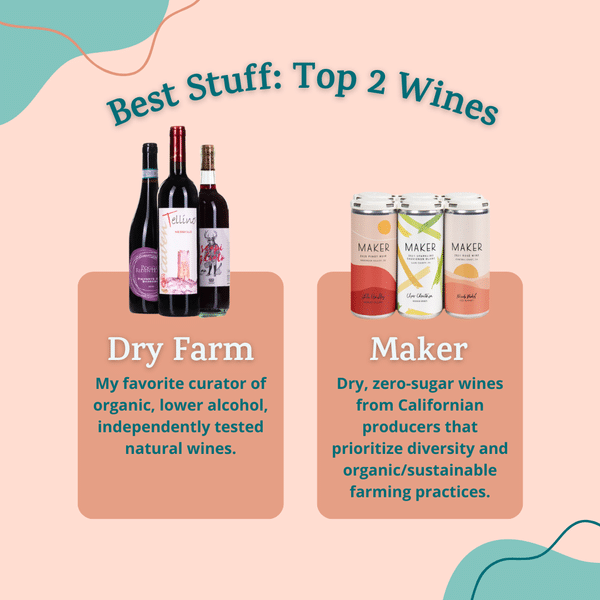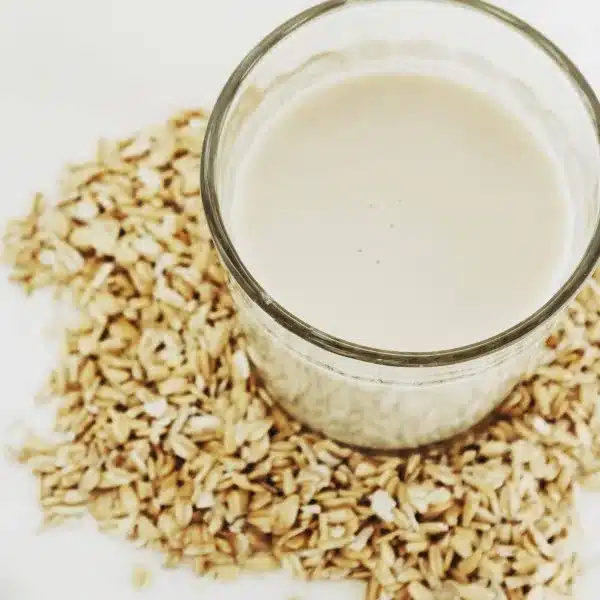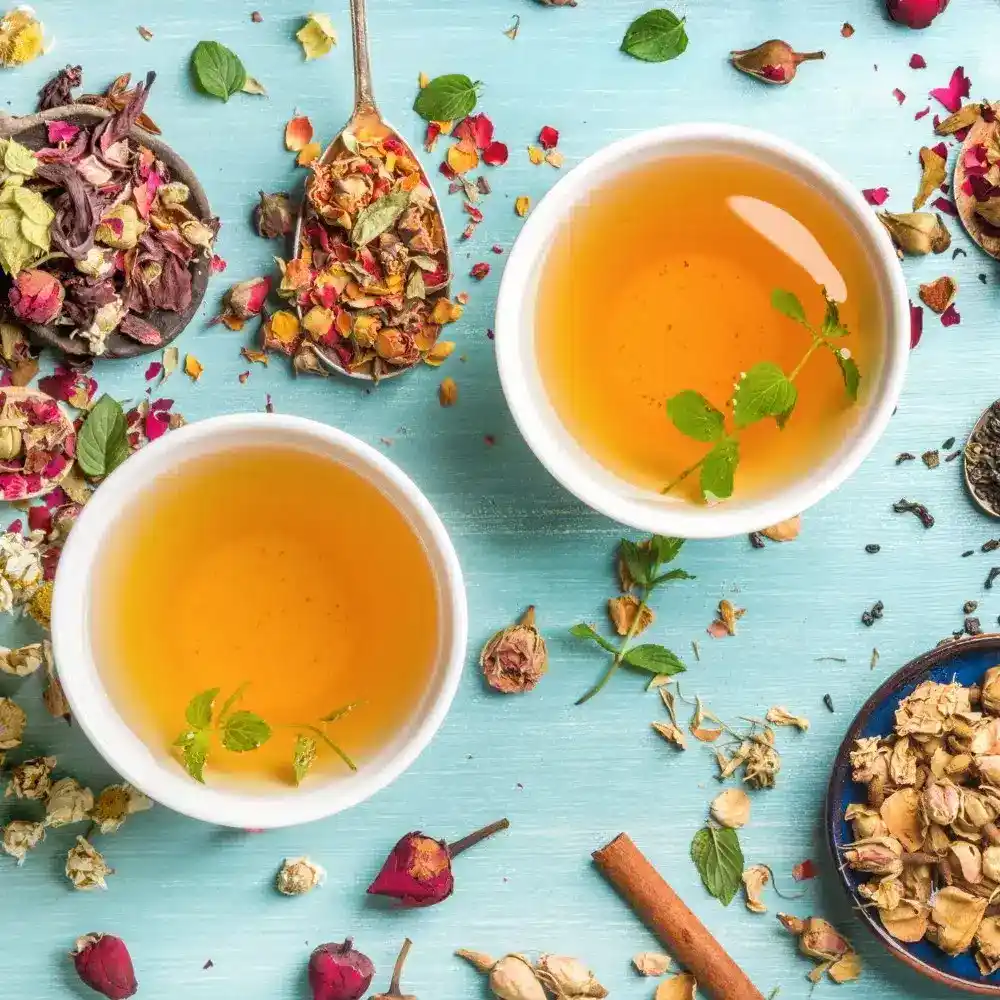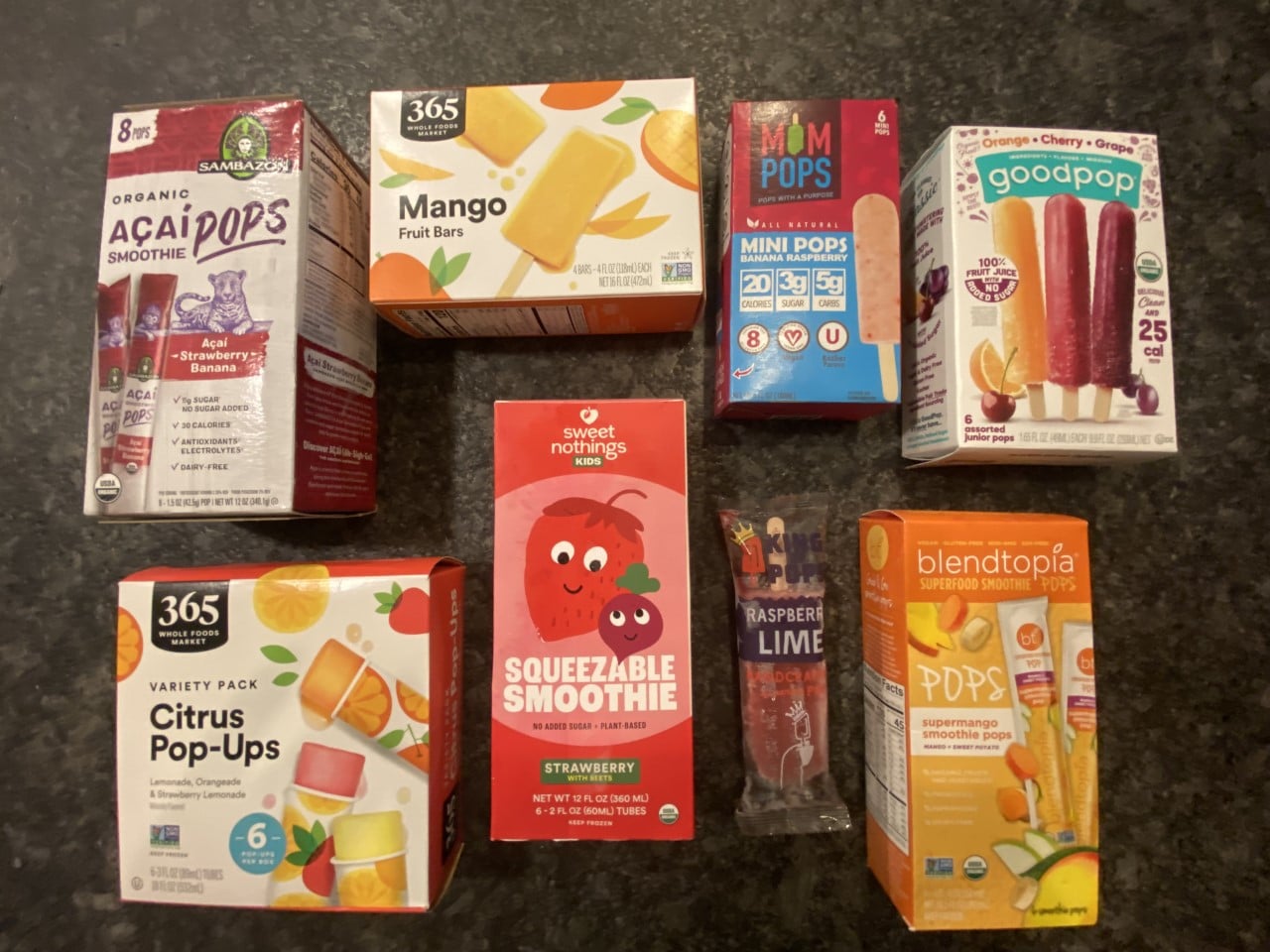The Healthiest Organic Wine Brands We’ve Found
Written by:
Maia James
11/29/2023

Updated: 12/22/2023
Looking for a different guide? Browse them all HERE.
If you follow us on Instagram, you know that we enjoy alcohol–despite knowing that it is absolutely a toxin. The trick, we think, is to indulge in only high quality drinks, and to ben intentional about drinking (rather than cracking a beer every night just because you’ve finally had a chance to sit down. (Here are other hacks to reduce alcohol intake.)
As wine drinkers, we set out to find the healthiest organic and sulfite-free wines. Spoiler alert: Our top pick is Dry Farm Wines and we also love Maker Wine. Both of these companies source the globe for the best organic wine, and send it right to your door.
Whether you choose these wines or another organic brand, this post will outline how to choose the cleanest wines.
Is It Better to Buy Organic Wine?
A good organic wine is sulfite-free, sugar-free, and obviously tastes great! But before getting into what makes organic wine brands so healthful, let’s talk about regular wine. Here’s what’s wrong with most of the wine you can buy in the United States:
- Additives. Wines in the U.S. can include as many as 76 additives without having to disclose them on the label? These can include defoaming agents, ammonia, sawdust to mimic an oaky flavor, GMO yeasts, sulfites, artificial coloring to darken red wine, sugar or high fructose corn syrup, and “fining agents” like polyvinyl-polpyr-rolidone. All of these additives provide a consistent taste, color to wine, speed up wine production.
- “Big Wine.” Just three huge companies make more than half of the thousands of wine brands in the U.S.
- Herbicide residues. Grapes are always on the Dirty Dozen list, meaning they have high pesticide and herbicide residue. As a result, most wines contain traces of pesticides and herbicides (usually Roundup, since that’s what is sprayed on most grapes).
- Sulfites. Wine can never be entirely sulfite-free because yeast produces sulfur dioxide during fermentation. Problems arise when winemakers add sulfites as a preservative, which can cause asthma in sensitive individuals, and which some believe increases their hangovers. Conventional wines have as much as 400 parts per million (ppm) of sulfites.
The Healthiest Wine Brands to Drink: Meet Dry Farm Wines
Several years ago, my mom stumbled upon a wine delivery service that delivers only organic, incredibly clean, and independently-tested wines. We’ve never looked back.
Dry Farm Wines curates the highest quality clean wines from small, organic family farms. These wines meet really strict health standards. Every bottle is lab and taste tested, and then it is delivered to your door monthly or every other month.
Dry Farm Wines defines “natural wine” as real wine made with native yeast and healthy grapes grown organically or biodynamically. They also make sure all of their wines have no unnecessary additives. You can even find low-alcohol organic red wines through Dry Farm.
Whether you’re looking for organic red wine brands or low-sulfite wine, you have your pick of the best organic sugar-free wine when ordering from Dry Farm.
Every bottle of Dry Farm Wine is:
- Sugar-free (lab-tested for frucose and glucose).
- Carb-free (no sugar means no carbs!).
- No added sulfites.
- Dry-farmed.
- Friendly to every diet, including Paleo, low-carb, and Ketogenic.
- Organically or biodynamically grown (meaning holistic and ethical farming!).
- Legitimately delicious. I have yet to open a bottle of this and not like it.
More Clean Wine Brands: Meet Runner-Up Maker Wine
Recently, we learned about Maker Wine, and decided they deserved special mention here. Maker offers premium canned wine that’s crafted by diverse, small-batch wine makers. Each can is a single-pour and measures 1/3 of a bottle of wine. Every variety of wine comes from organic and sustainable farming practices, and you can join their Can Club for 20% off a quarterly delivery of 12+ cans.
Every can of Maker Wine is:
- Sugar-free.
- <5g carbs.
- Dry-farmed.
- Friendly to every diet, including Paleo, low-carb, and Ketogenic.
- Organically or biodynamically grown (meaning holistic and ethical farming!).
- Made in small batches.
- Delicious (so far! I have tried three cans.)

FAQs About Organic Wine Brands
Do Clean Wine Brands Use Dry Farming?
Dry farming means growing grapes without the use of irrigation. The practice saves 16,000 gallons of water per acre per year because it relies on natural rainfall. Dry farming also results in better-tasting grapes and therefore richer tasting wines. Unfortunately, fewer than 1% of American vineyards grow grapes via dry farming.
Does This Organic Wine Taste Good?
For me, the best part about Dry Farm Wines might be just how delish these wines are. I usually get the mixed delivery, which includes two reds, a white, a rose, a sparkling rose, and a sparkling white wine.
I wouldn’t call myself a wine snob, but I am relatively picky and though every single bottle was great. No wine is too sweet, or felt burny on the throat. Every wine is super easy to drink (for better or worse!).
I have not tried as many of the Maker Wines, but I recently got a 6-pack of sparkling roses and whites, and they were all crisp, light, and delicious. I am excited to try more!
Are these Organic Wine Brands Really Hangover-Free?
I can’t speak for other organic wines, but I’ve never had a hangover from any Dry Farm wines or Maker wines.
I haven’t guzzled an entire bottle to test this theory, but I tend to get hangovers easily — especially from red wine. It seems that Dry Farm allows me to enjoy the best organic red wines, without the hangover.
This makes sense since Dry Farm wines have less sugar and less alcohol than conventional wines. I can have that extra glass without feeling extra tipsy. The lack of preservatives, artificial colors, added sulfites, and mold may also help.
Is It Worth Buying Organic Wine?
Every bottle of Dry Farm Wine is around $25. Admittedly, this is more than I usually spend when I pop over to the wine store. This higher price includes shipment, but this link will get you an extra bottle for a penny.
A case from Maker Wine usually is a little pricier, but you get the convenience of single servings. Each case includes 6 cans (= 2 bottles) and ranges from $48 to $78, depending on the type of wine. That’s roughly $24 to $39 a bottle. To save more, use this link to get an extra 15% off.
I’m no sommelier, but all of these wines taste like they cost more than $25 a bottle. For that reason, I’m okay with the cost.
Is Drinking Organic Wine Healthful?
This is a tough question to answer. My take is that if you don’t drink, don’t start in an effort to become healthier.
If you do drink, I probably don’t need to remind you that while some wine consumption is okay or maybe good for you, too much is decidedly bad. There may be some benefits to light drinking, which include:
- Lowered risk of heart disease, thanks to increased levels of “good cholesterol” from drinking wine, especially red wine.
- Aging more slowly. Procyanidins found in red wine may be responsible for the longer life spans of people living in the Mediterranean. Procynaidns may even reduce wrinkles. Red wines produced the traditional way have the highest levels of procyanidins.
- Improved brain function. Studies also show that moderate drinkers have a slower decline in brain function than those who abstain from alcohol.
- Increased life expectancy. Studies also show that wine drinkers typically live longer than beer or hard liquor drinkers.
- Better mental health. At least one study has shown that those who drink up to seven glasses of wine each week are less likely to suffer from depression than those who don’t drink.
How to Find Good Organic Wine Brands
Honestly, clean wines have kind of ruined me for any other kind! The food I buy is more expensive than “normal” food, so I’m comfortable with spending more on wine, too. I’m just drinking much less of it.
That said, if a Dry Farm Wine of Maker Wine isn’t in your budget, you can:
- Look for the USDA organic label on the bottle. This means the wine is made from organically grown grapes, but it does not mean the wine won’t contain other problematic additives.
- Ask the staff at your local Whole Foods, or even a good wine store, to point you to the organic or biodynamic wines. Some wines won’t be labeled.
- When in doubt, choose wines from France, Switzerland, and Austria. European wines are more likely to be organic and dry-farmed.
Please comment below with other healthy, organic wine brands you’ve found!
Stay sane, and cheers!


Maia, Founder & CEO
Note: This article contains affiliate links or sponsored content, which means that if you make a purchase, we may earn a commission. We only recommend products that meet our strict standards for non-toxicity and that we use (or want to use!) ourselves. Thank you so much for supporting the brands that make Good Stuff!
Enjoying this guide?
Join 60K families who rely on our free guides on everything from milk to mattresses! Sign up to get $5 off your first order, access to our ultimate Clean Products Cheat Sheet, and ongoing exclusive access to coupon codes and promotions. Our weekly newsletter is filled with well researched tips and tricks to live a toxin-free lifestyle.
Related Posts
Healthy Store Bought Oat Milk Guide 2024
How To Avoid Drinking Toxic Tea
Healthy Yogurt Guide
Healthiest Popsicles Guide
-
They do seem to add sulfites to every bottle I’ve gotten from them so far…and also curious about the organic bit?
-
Was there any followup on the above organic wines and chemicals…
-
Have you done any research on the company, scout and cellar?
-
No, but we will now!
-
I would be curious to know about this as well- although on their FAQ they claim they do not use “synthetic pesticides” and “non-organic chemicals”, they don’t seem to claim to actually be an organic wine? Although my multiple neighbors who are now selling it tell me otherwise!
Grace
-
-
I’m in the same boat as Carrie; I need safe wine to drink that doesn’t cost over $25 per bottle. Frey Winery in Calif. is a old organic/biodynamic winery. I’m going to e-mail them and ask what additives they add to their wines. I work for a consumer goods company and we provide safety data sheets on the internet (the ingredients) for each product we sell. Wish me luck! I’m betting 99.9% that I won’t get a response and / or they do not provide safety data sheets.
-
Hi Melodie, If you do receive a response, will you post it here? I’d love to know….
Thanks,
Martha-
Yes, please do share what you find out!
-
What did Frey respond to you? I see that wine locally and it is cost effective.
-
I think Frey is a good choice to buy in the wine store because it’s organic. However, I don’t find it to be very good, as far as taste goes. And there is the issue with US wines all having glyphosate (Round UP) which is used profusely all over the US.
-
-
-
-
Oregon is home to dozens of certified organic wineries, including King Estate – the largest biodynamic vineyard in the USA! Many organic/biodynamic wine-makers from the Pacific Northwest are also members of the Deep Roots Coalition for dry farming and LIVE-certified (Low Input Viticulture and Enology) for sustainable agriculture practices. I’m always conscious of the carbon footprint shipping heavy glass bottles around the world, so I consider myself lucky to have lots of healthy options nearby. There are too many delicious ones to list here, but I highly recommend exploring Oregon wines! Thanks for all you do, Maia.
-
Hi Micah, Great! Sounds like Good Stuff. There is still a problem with USA wines and the prevalence of glyphosate even when they are organic. Unfortunately, it’s so overused here it blows in from other farms. However, weighing that against the carbon footprint of shipping wines from Europe, I agree this is a good option.
-
-
Frey Vineyards is a good option, Wegmans sells it as well as Total Wine. I spend 8.99 a bottle and alternate between white and red.
-
Thanks for this! I love drinking a daily glass of wine with dinner and need to find good organic red wines that aren’t crazy expensive.
-
-
That wine sounds great but it’s so much more expensive than organic wines I found in stores… have you tried any of the organic wines from Trader Joe’s? And what do you think of Bonterra?
-
I do like some of the Bonterra wines especially the Chardonnay!
-





Leave a Reply
You must be logged in to post a comment.